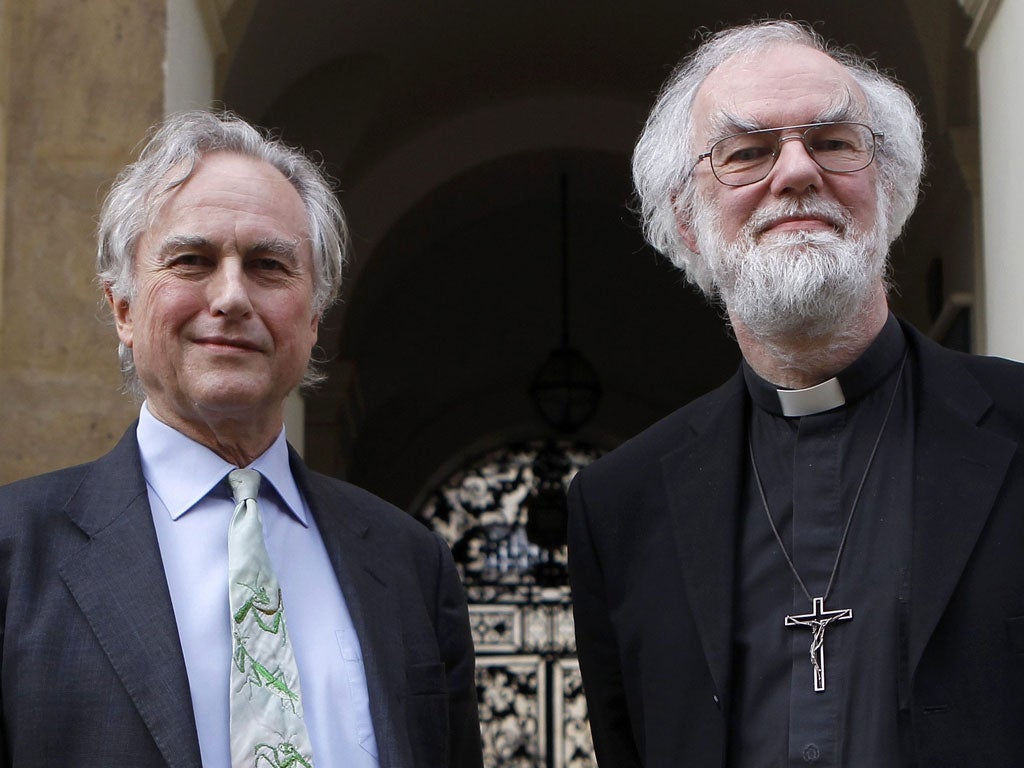Science vs God: Richard Dawkins takes on Archbishop of Canterbury
Yesterday Richard Dawkins went head-to-head with Rowan Williams in a televised debate about evolution. So who won? Tim Walker was watching

Oxford University held its first debate on the subject of evolution in 1860, just months after the publication of Darwin's On the Origin of Species. Then, the Bishop of Winchester, Samuel Wilberforce, famously enquired of the biologist Thomas Henry Huxley whether it was through his grandmother or his grandfather that he traced his descent from a monkey. The response he drew from the man known as "Darwin's bulldog" ensured that the exchange went down in history.
Yesterday, the university hosted what seemed tantalisingly like a similar clash of great minds, between the Archbishop of Canterbury, Rowan Williams, and Professor Richard Dawkins – like Huxley, a bulldog on behalf of Darwin's theories. But anyone hoping for a dust-up would have been sorely disappointed, for the conversation was conducted with utmost politeness. The cleric even confessed his belief in evolution, and agreed with Dawkins that humans shared non-human ancestors. Wilberforce would be turning in his grave – assuming, as Williams does, that the soul survives death.
The gentility of Dawkins and Williams's confrontation was in sharp contrast to its febrile context. On a visit to the Vatican this month, the Tory party chairman, Lady Warsi, warned of the "militant secularisation" of society, presumably led by scientists such as Professor Dawkins. Dawkins subsequently made headlines by forgetting the full title of Darwin's seminal work (On the Origin of Species by Means of Natural Selection, or the Preservation of Favoured Races in the Struggle for Life) during a live radio broadcast. He even faced a character assassination by a Sunday newspaper last weekend, on the basis that some of his ancestors probably owned slaves.
Dawkins can call on 150 years or so of fossil-hard scientific evidence; Williams, on 2,000 years or so of faith. The atmosphere in the Sheldonian Theatre, however, was anything but incendiary. Rather than lecterns and thumping fists, the protagonists sat in comfortable chairs, sipping tap water. This was less a debate than a discussion, chaired by the esteemed philosopher Sir Anthony Kenny, who introduced himself as "a representative of ignorance".
Rather than arguing, Dawkins and Williams seemed intent on finding areas of agreement. Did the Archbishop agree that there was probably no "first man", that human evolution was gradual, and that – in Dawkins' formulation – no pair of Homo erectus parents gazed down proudly at their Homo sapiens newborn? He did. "The Pope thinks that," Dawkins claimed. "I'll ask him sometime," Williams replied.
Could Dawkins disprove the existence of God? He could not, he confessed, describing himself not as an atheist but as an agnostic – to gasps from Twitter, where the unlikely #dawkinsarchbishop hashtag was trending. On his own atheism scale of one-to-seven, the Professor suggested, "the probability of any supernatural creator existing is very, very low, so let's say I'm a 6.9".
They did, finally, come to verbal blows – or gentle nudges, at least – over the origins of the universe. "The writers of the Bible, inspired as I believe they were, were not inspired to do 21st-century physics; they were inspired to pass on to their readers what God wanted them to know," Williams argued. "In the first book of the Bible is the basic information – the universe depends on God, humanity has a very distinctive role in that universe, and humanity has made rather a mess of it."
"I am baffled," responded Dawkins, "by the way sophisticated theologians who know Adam and Eve never existed still keep talking about it." God, he said, "cluttered up" his scientific worldview. "I don't see clutter coming into it," Williams replied. "I'm not thinking of God as an extra who has to be shoehorned into it."
Wholly spirited: Previous debates
Thomas Henry Huxley vs Bishop Samuel Wilberforce (Updated 14:00 24/02/2012)
At the 1860 Oxford evolution debate, Wilberforce asked Huxley whether it was through his grandfather's or his grandmother's lineage that he descended from a monkey. Huxley said he had no shame in having monkeys as ancestors, but that he would be mortified to be associated with a man who used his intellectual powers for sophistry.
Martin Luther vs Pope Leo X
Pope Leo's offer of indulgences to those who rebuilt St Peter's Basilica in Rome was seen as bargaining for salvation by Luther, whose refusal to withdraw his critical writings led to his excommunication in 1521. He went on to initiate the Protestant Reformation.
Monty Python vs Muggeridge and Stockwood
At the height of the religious backlash against Monty Python's Life of Brian in 1979, Michael Palin and John Cleese appeared on the BBC2 programme Friday Night, Saturday Morning to debate with journalist Malcolm Muggeridge, who described the film as a "squalid number" and "tenth-rate", and the Bishop of Southwark, Mervyn Stockwood. The Python cast argued that they had misunderstood the film.
Elizabeth Anscombe vs CS Lewis
When Anscombe presented a paper disputing CS Lewis's writings on Christian theology in 1948, the Chronicles of Narnia author was said to be so humiliated that he instead turned to the more light-hearted world of children's writing. Anscombe, a formidable philosopher, gave her opponent a little more credit, saying she appreciated his rewrites.
Subscribe to Independent Premium to bookmark this article
Want to bookmark your favourite articles and stories to read or reference later? Start your Independent Premium subscription today.

Join our commenting forum
Join thought-provoking conversations, follow other Independent readers and see their replies